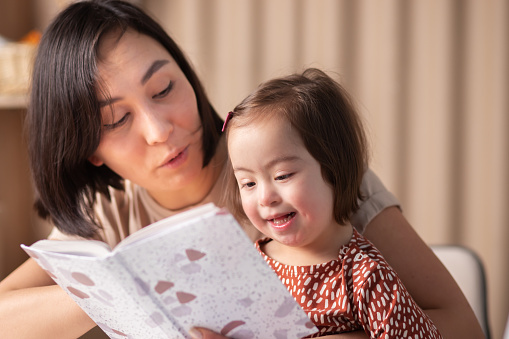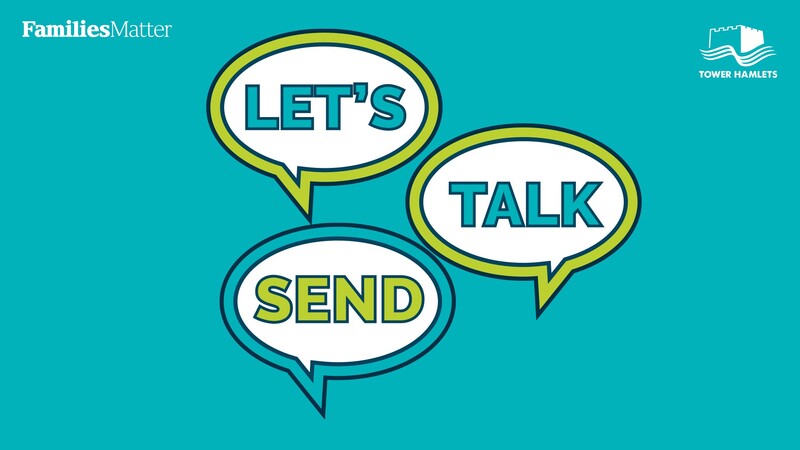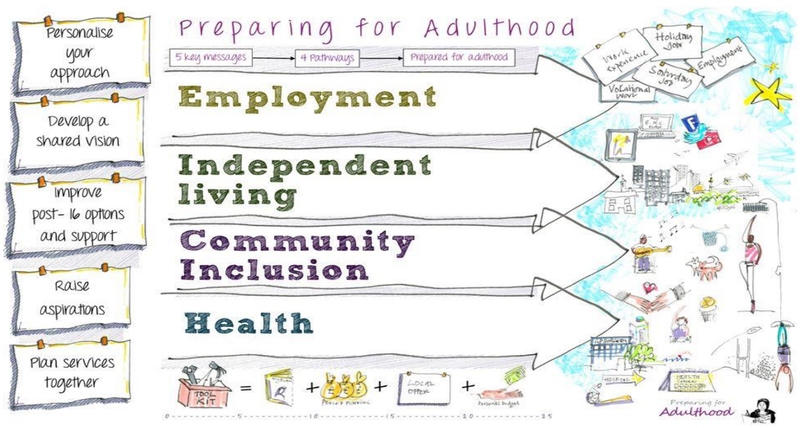{{ root_page.title }}
Let’s Talk SEND
Let’s Talk SEND
In Tower Hamlets the views of parents and carers are highly valued.
The council and its partners are committed to working and communicating closely with parents and carers to ensure all parents have good support, understand what support is available to them and understand the improvements we are trying to make following the Local Area SEND inspection.
Between 28 June 2021 and 2 July 2021, Ofsted and the Care Quality Commission (CQC), conducted a joint inspection of the local area of Tower Hamlets to judge the effectiveness of the area in implementing the special educational needs and/or disabilities (SEND) reforms as set out in the Children and Families Act 2014. Full details can be found on Joint area SEND inspection in Tower Hamlets page.
Following the SEND Local Area Inspection Let’s Talk SEND events have been developed in partnership with the SEND Independent Parent Forum and build upon the existing models such as the SIPF Health Events and the Tower Hamlets Parent and Carer Council.
Parents and carers of children and young people on SEN Support or with an Education, Health and Care Plan are encouraged to attend the termly Let’s Talk events to share their experiences and help shape services in the future.
Updates
- Written Statement of Action
- SEND Improvement Plan
- Transitions to Adult Services
- Preparation for Adult Life
- National updates:
- Education White Paper
- SEND Green Paper and Consultation
- Consultation on Annual Review timescales
- New Local Area Inspection Framework



Written Statement of Action
The Four Areas of the Written Statement of Action for Tower Hamlets Local Area:
1. The poor quality and oversight of EHC plans including the annual review process
2. The lengthy waiting times for an assessment and diagnosis of Autistic Spectrum Disorder (ASD)
3. Fragmentation in the provision of Speech and Language Therapy (SLT) which means that too many children and young people do not get the specialist help and support they need.
4. Weaknesses in communication between area leaders and parents leading to misunderstandings. Many families are not aware of services that they could access and have no knowledge of area’s plans to improve.
First monitoring Meeting took place on the 28th April 2022
• DFE/NHSE monitoring progress of the WSoA
• Significant investment in staffing and resources across the partnership
• Increased staffing in SEN and Educational Psychology
• New pathway for ASD assessment from April 2022
• Increased diagnostic capacity for ASD
• Direct commissioning of Barts Health to deliver the Speech and Language Treatment Pathway for age 3-5s and a Social Communication Difficulty Pathway for age 0-5s.
• Regular engagement with Parents and Young Adults through Let’s Talk SEND events and commitment to widen participation and co-production
Summary
• Leaders are working well together across the partnership. There is a robust leadership and governance structure in place for SEND and for monitoring the progress of the WSoA. Leaders are ensuring investment is being made where needed in the staffing and resourcing of SEND services.
• Positive progress has been made in a number of areas and foundations being laid to develop some new models and ways of working. A QA framework has been developed to improve quality of EHCPs and templates for plans and ARs have been revised.
• Arrangements for engaging parents and young people are in place but the Local Area want to increase the scope and numbers involved and expand the feedback opportunities.
• Some early deadlines for WSoA actions have slipped. The local area feel this is due to a combination of being unrealistic with their original timescales in the WSoA, ongoing impact of COVID and the time lag between investment and recruitment of staff. Leaders have identified the reasons, revised timescales and are committed to accelerating progress where they can. DfE and NHSE stressed the importance of the local area demonstrating that everything is being done to ensure further timescales are not missed.
SEND Improvement Board Annual Report
SEND Improvement Board Annual Report 2021
Preparing for Adulthood
Steps to Employment - Tower Hamlets
• Tower Project: 1 year Supported Internship Programme for young people who want to work in the Hospitality and Leisure sector.
• Tower Project: Pre-Internship programme for 17 - 24-year-olds who hold an EHCP and want to work but are not ready for an Apprenticeship or Supported Internship.
• The DFN Project Search is a Supported Internship programme based at Queen Mary University of London in partnership with Phoenix School/College and Tower Hamlets Council.
• DFN Project Search – Marriott Canary Wharf and Goldman Sachs Supported Internships
•Tower Hamlets Council Apprenticeship: A 15-month inclusive apprenticeship programme for young people over the age of 16 who hold an EHCP.
• New City College: A 12-month work-based Supported Internship Programme for 16 – 25-yearolds.
• The main entry criteria for these programmes is an aspiration to work, increase independence and exist as a contributing member of the community.
Steps to Employment Out of Borough
• Supported internships in hospitals via DFN Project Search
- Homerton Hospital – Hackney
- Whipps Cross Hospital – Leytonstone
- Royal London Hospital - Whitechapel
- Newham Hospital - Newham
- St Bartholomew's Hospital – City of London
Sources of Information:
• Local offer: https://www.localoffertowerhamlets.co.uk/
• Young Workpath: [email protected]
• SEN Team Main line: 0207 364 4880
• PfA SEN Team email: [email protected]
Transition 14+ Preparing For Adulthood
Anwarul Haque – CWDT Team Manager
Sami Haider – CLDS Team Manager
Introduction to Transition (PDF link)
What does Transition mean?
• It is the process in which an individual is going through a process of change from one position to another
• Children go through various transition phases in their life, for example, starting a nursery setting, moving onto primary education, moving to secondary education and further education, training or employment thereafter.
• Transition can bring about worry for parents, children and young people as there are lots of changes that may happen as a result of this.
• Change of placement/new environment
• New routine
• New route to and from the placement
• New people/new relationships
• Changes in body
• Changes in law
• Change of benefit entitlement
How can we support you?
• To work in partnership with each young person and their families – supporting throughout the transition from children’s services to adult services.
• To refresh and comply with the Transitions Protocols and Procedures
• To ensure all partner organisations are involved in aligning resources, effective communication, joint training for staff, and reaching agreements on multi-agency working
• Ensure disabled young people and their carers are involved in reviewing the effectiveness of the Transitions procedure
Who do we work with?
Children with Disabilities Team
Group A: Children and young people with Autistic Spectrum Disorder (who have severe learning disabilities or behaviour which is challenging) or those children and young people whose challenging behaviour is associated with other impairments such as severe learning disabilities.
Group B: Children and young people with complex health needs including those with physical and/or learning disabilities, those who require palliative care (continuing care) and those with associated sensory impairments. Complex health needs includes children and young people with profound and multiple learning difficulties and complex and severe medical needs who may also have an additional physical and/or sensory impairment.Community Learning Disabilities Service Person has a Learning Disability which includes the presence of:
• A significantly reduced ability to understand new or complex information, to learn new skills (impaired intelligence), with;
• A reduced ability to cope independently (impaired social functioning);
• These both started before adulthood, with a lasting effect on development.
Pathways
From Age 14: Children's Social Care give early notification of the CYP from 14 years old to Adult Social Care (ASC) IA Team at the annual tracker meeting* if they think they may be eligible under the Care Act.
Post 16: Annual team level meetings to discuss potential referrals and agree referrals etc. ASC may carry out an initial assessment at this point for those who are looking at pursuing further education and/or changing accommodation where a longer planning period may be required.
17-18: ASC Initial Assessment Team assesses YP post17. May refer directly to Reablement. Essential criteria = eligibility under the Care Act.
From 18: If eligible - care package arranged and funded by ASC from 18th birthday.
*Annual tracking meeting attended by SEN for schools, CwD, ASC and LD including BSO for ASC. New potential referrals taken and pathway for each CYP agreed. Note referral on Mosaic and upload EHCP. Annual team level meeting with IA, children's OT and relevant children's service to discuss all referrals held in IA to agree appropriate time for referrals for info and advice, community resources, skills training/reablement. Children's skills training and adults reablement must have a clear handover.
What we want to achieve?
• A successful introduction to adult life
• Promote greater control, choice and independence
• Working on existing skills and developing confidence
• Positive risk taking in a safe way
• Help achieve your hopes, goals and aspirations
• Recognising strengths and building on these throughout your adult life
• Supporting to manage your own physical, mental and emotional health
• Support you to develop/maintain friendships and relationships
• Supporting you to be an active member of your community
• A newly formed ‘Transition Board’ has been set up to improve the experience of transition.
Contacts
Children with Disabilities Team
• Duty Line: 0207 364 2724
• CWD Duty Email: [email protected] Tower Hamlets Connect
• Duty Line: 0300 303 6070 Community Learning Disabilities Service
• Duty Line: 020 7771 5500
• CLDS Duty email: [email protected]
Video on transition
• https://www.youtube.com/watch?v=iaKJi5ztDEw
• https://www.youtube.com/results?sp=mAEB&search_query=tra nsition+learning+disability+uk
• David Mason's Journey.mpeg - YouTube
• Shane's experience of transition planning (preparingforadulthood.org.uk)
Spotlight
What is Spotlight? ( PDF link)
A free Creative Arts Youth Service in Poplar.
Serving young people aged 11-19, 25 with SEND.
In 2021, we engaged 2515 across our service.
CONTEXT - SEND ENGAGEMENT
1.5 years of increased engagement with disabled and neurodivergent young people
Spotlight Superheroes
Creating a space where young people feel heard, valued and empowered
Youth voice
COVID - democratisation of youth services
Partnership work
We are currently partnered with international charity, SENSE UK, who specialise in supporting and advocating for people with complex disabilities. Our young people have benefitted from referall onto the sense buddying programme.
Take over day
Parent / carer / professionals on-boarding session:
Our Time Forum
TH Parents' SEND Forum
SENSE - ELBS HealthSpot
TH C-19 Ambassadors
Where are we now
Inclusive sessions across Creative programme
Industry standard collaborations.
On demand Sensory Space
Sensory boxes
Disability training for all youth facing staff.
Disability Audits complete for all centres.
Long term vision
Culture change - FoH and BoH
Staff + young people
Non-silo approach
Normalisation
A truly inclusive service for all young people
Dates for the diary
26th July, 5-7pm - NEXT SUPERHEROES SESSION
Check out our packed summer holiday programme for loads of inclusive activities.
All sessions will take place at Spotlight, 30 Hay Currie ST, E14 6GN
Get in touch with us by phone call, text or email!
Harry Forshaw [email protected] / 07852 444 675
Ellie Whittle [email protected] / 07960 989 423

